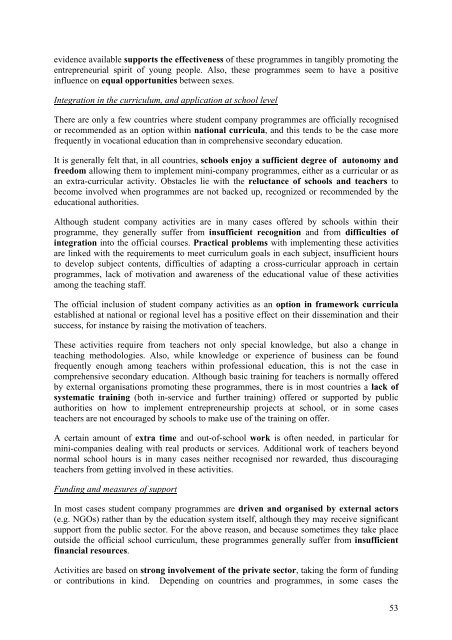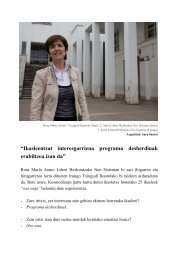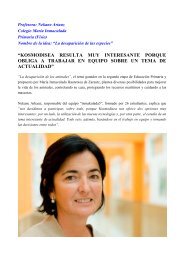Final Report of the Expert Group - European Commission - Europa
Final Report of the Expert Group - European Commission - Europa
Final Report of the Expert Group - European Commission - Europa
You also want an ePaper? Increase the reach of your titles
YUMPU automatically turns print PDFs into web optimized ePapers that Google loves.
evidence available supports <strong>the</strong> effectiveness <strong>of</strong> <strong>the</strong>se programmes in tangibly promoting <strong>the</strong>entrepreneurial spirit <strong>of</strong> young people. Also, <strong>the</strong>se programmes seem to have a positiveinfluence on equal opportunities between sexes.Integration in <strong>the</strong> curriculum, and application at school levelThere are only a few countries where student company programmes are <strong>of</strong>ficially recognisedor recommended as an option within national curricula, and this tends to be <strong>the</strong> case morefrequently in vocational education than in comprehensive secondary education.It is generally felt that, in all countries, schools enjoy a sufficient degree <strong>of</strong> autonomy andfreedom allowing <strong>the</strong>m to implement mini-company programmes, ei<strong>the</strong>r as a curricular or asan extra-curricular activity. Obstacles lie with <strong>the</strong> reluctance <strong>of</strong> schools and teachers tobecome involved when programmes are not backed up, recognized or recommended by <strong>the</strong>educational authorities.Although student company activities are in many cases <strong>of</strong>fered by schools within <strong>the</strong>irprogramme, <strong>the</strong>y generally suffer from insufficient recognition and from difficulties <strong>of</strong>integration into <strong>the</strong> <strong>of</strong>ficial courses. Practical problems with implementing <strong>the</strong>se activitiesare linked with <strong>the</strong> requirements to meet curriculum goals in each subject, insufficient hoursto develop subject contents, difficulties <strong>of</strong> adapting a cross-curricular approach in certainprogrammes, lack <strong>of</strong> motivation and awareness <strong>of</strong> <strong>the</strong> educational value <strong>of</strong> <strong>the</strong>se activitiesamong <strong>the</strong> teaching staff.The <strong>of</strong>ficial inclusion <strong>of</strong> student company activities as an option in framework curriculaestablished at national or regional level has a positive effect on <strong>the</strong>ir dissemination and <strong>the</strong>irsuccess, for instance by raising <strong>the</strong> motivation <strong>of</strong> teachers.These activities require from teachers not only special knowledge, but also a change inteaching methodologies. Also, while knowledge or experience <strong>of</strong> business can be foundfrequently enough among teachers within pr<strong>of</strong>essional education, this is not <strong>the</strong> case incomprehensive secondary education. Although basic training for teachers is normally <strong>of</strong>feredby external organisations promoting <strong>the</strong>se programmes, <strong>the</strong>re is in most countries a lack <strong>of</strong>systematic training (both in-service and fur<strong>the</strong>r training) <strong>of</strong>fered or supported by publicauthorities on how to implement entrepreneurship projects at school, or in some casesteachers are not encouraged by schools to make use <strong>of</strong> <strong>the</strong> training on <strong>of</strong>fer.A certain amount <strong>of</strong> extra time and out-<strong>of</strong>-school work is <strong>of</strong>ten needed, in particular formini-companies dealing with real products or services. Additional work <strong>of</strong> teachers beyondnormal school hours is in many cases nei<strong>the</strong>r recognised nor rewarded, thus discouragingteachers from getting involved in <strong>the</strong>se activities.Funding and measures <strong>of</strong> supportIn most cases student company programmes are driven and organised by external actors(e.g. NGOs) ra<strong>the</strong>r than by <strong>the</strong> education system itself, although <strong>the</strong>y may receive significantsupport from <strong>the</strong> public sector. For <strong>the</strong> above reason, and because sometimes <strong>the</strong>y take placeoutside <strong>the</strong> <strong>of</strong>ficial school curriculum, <strong>the</strong>se programmes generally suffer from insufficientfinancial resources.Activities are based on strong involvement <strong>of</strong> <strong>the</strong> private sector, taking <strong>the</strong> form <strong>of</strong> fundingor contributions in kind. Depending on countries and programmes, in some cases <strong>the</strong>53




